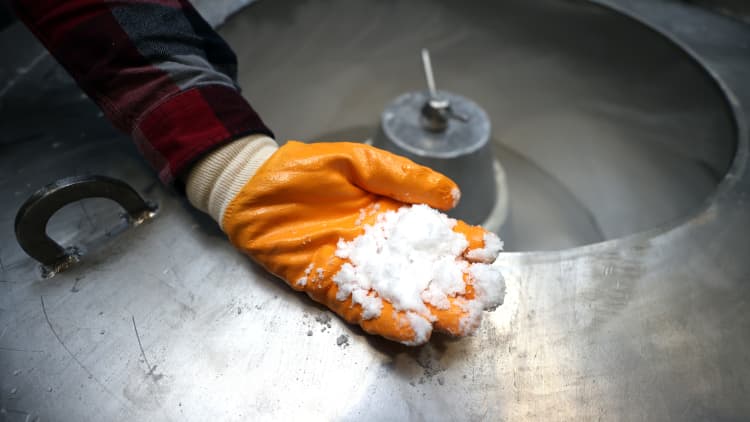[ad_1]
Brine pools at the Albemarle Corp. Lithium mine in Calama, Antofagasta region, Chile, on Tuesday, July 20, 2021.
Cristobal Olivares | Bloomberg | Getty Images
General Motors‘ announcement on Tuesday that it plans to invest $650 million into Lithium Americas to secure access to lithium is probably the first of many such deals, according to Simon Moores, the CEO of Benchmark Mineral Intelligence, a market intelligence company that tracks the supply chain of lithium-ion batteries to electric vehicles.
“Many of these industries have to be built from scratch, certainly lithium-ion batteries and electric vehicles, the whole blueprint, the whole infrastructure is being built, literally, from scratch,” Moores told CNBC.
Automakers are starting to realize that the only way to guarantee lithium supplies is to own or have a controlling stake in the source.
“It’s the only way you’re going to have the edge and guarantee you can make EVs over the next 20 years,” Moores told CNBC.
“EV companies, especially the auto majors, have learnt the hard way over the last five years that scaling batteries — gigafactories — is much easier and quicker than scaling mining,” Moores said.
It takes about two years or more to build a gigafactory and 10 years or more to finance and build a lithium mine, Moores said. Going forward, automakers will need to make even larger investments in mining, according to Moores.
“This $650 million is a significant investment,” but “what the industry really needs” is checks in the billions of dollars, Moores said, “otherwise these EV goals will not be met.” GM’s investment in Lithium America “is only literally one piece of an ever-growing puzzle,” he added.
Nickel will also be important for automakers, in addition to lithium, Moores told CNBC.
“Lithium and nickel are really what terrifies EV makers,” Moores told CNBC. “You’ve got to scale significantly.”
Beyond taking lithium out of the ground, EV makers will have to scale up production of chemical versions of those minerals, such as lithium hydroxide carbonate and nickel sulfate, which make the supply chain scaling process “just that little bit harder and a bit more longer term,” Moores said.
The price for that lithium carbonate has been on an absolute tear as of late. Prices were hovering between $5,000 and $8,000 per ton in 2020, and they reached as high as $27,000 per ton in 2021and $68,366 per ton in December, according to data from Benchmark for the global weighted average.
“The rush for lithium has just started. It is a land grab,” Moores told CNBC. “This land grab will last the next decade. I don’t think this is a two- or three-year thing. I think this is a decadelong process.”

[ad_2]
Source link
